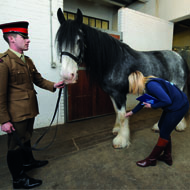
Leading equestrian organisations pledge their support.
A national equine survey organised by the Blue Cross, which aims to record common health issues in horses, has received backing by leading equestrian organisations.
The National Equine Health Survey (NEHS) will be held from 18 - 24 May and will contain questions on equine infectious diseases and include new questions on ragwort, which is causing growing alarm amongst equine health and welfare organisations.
Major equestrian organisations, including the ABRS, BEF, BETA, BHS, BSJA, Equestrian Needs, HAPPA, Horses4Homes, Horse Trust, LANTRA, Mare and Foal Sanctuary, NEWC, Pet ID Equine, Redwings Horse Sanctuary, Rossdales, RSPCA, SWHP, TBA, WHW and WPCS, have voiced their support for the NEHS.
The results of the national survey will help build a picture of the health and disease in the UK and define priorities for future research, training and education. The new questions have been devised to help to find out more about yard biosecurity measures and the potential risks associated with horses being purchased from Europe.
Gemma Taylor, Education Officer at Blue Cross said: “This year the NEHS is more even important than ever, which is reflected by the fact that so many of our major equestrian bodies and charities have already signed up to take part. It’s only with help from all of you that we can make NEHS bigger and more valuable than ever. Please spare just five minutes to complete the survey so we can continue to build our knowledge to help improve the future health of our nation’s horses.”
All owners and keepers of horses are being urged to participate in the NEHS, click here for more information.



 The Federation of Independent Veterinary Practices (FIVP) has announced a third season of its podcast, Practice Matters.
The Federation of Independent Veterinary Practices (FIVP) has announced a third season of its podcast, Practice Matters.